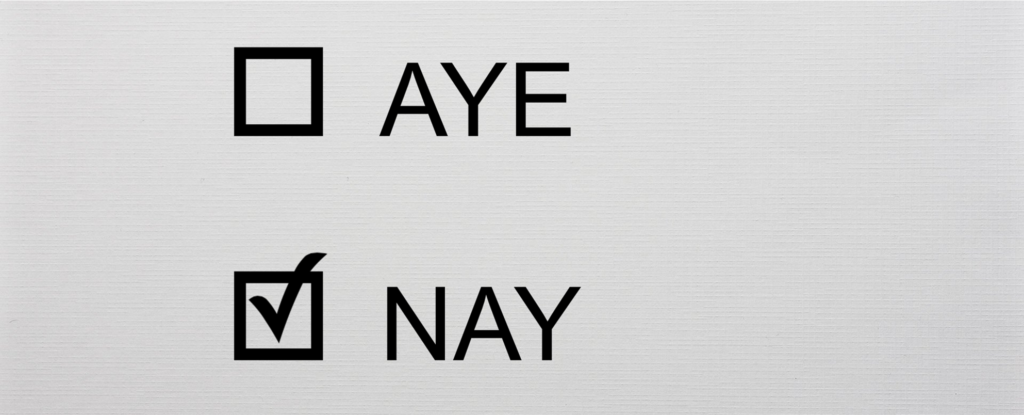I have moderated my fair share of meetings, session meetings and presbytery meetings in church polity speak. There’s something satisfying about coming to the end of debate, hopefully friendly conversation, and to the vote. “All those in favor say, ‘Aye.’” Then, “Opposed, ‘Nay.’” Usually, not always, I would pronounce, “The ayes have it. Motion carries.” It’s how we do things, and it mostly works.
It seems, though, that we are more and more living in a world where the nays have it, and it isn’t working well.
 There’s a good chance that no matter which presidential candidate garners the most votes, popular or electoral, on November 3, the nays will have it. Pew Research has probed our voters’ minds and we seem to be more against than for. Should former Vice President Biden win the election, a vote against President Trump will have propelled him to the White House, and, barring an unexpected landslide, should President Trump be re-elected, his margin of victory will come from those voting against Joe Biden.
There’s a good chance that no matter which presidential candidate garners the most votes, popular or electoral, on November 3, the nays will have it. Pew Research has probed our voters’ minds and we seem to be more against than for. Should former Vice President Biden win the election, a vote against President Trump will have propelled him to the White House, and, barring an unexpected landslide, should President Trump be re-elected, his margin of victory will come from those voting against Joe Biden.
It looks like the nays are going to have it.
Some may say it’s always been that way. Certainly, it has sometimes been that way, but not always.
It doesn’t take a poll to say so, though they say so; intuitively, personally, we experience a world where too often the nays have it. Whichever candidate gets our vote, many of us will vote nay on November 3.
There are, of course, good reasons to say nay, sometimes a loud nay, to what may come before us. Whether it is an awkward moment at a dinner party or in the secrecy of the voting booth, we must say nay, sometimes a loud nay, to injustice and oppression, callousness and disdain.
We must, however, do more than just allow the nays to have it, no matter how worthy the nay.
If I recommend a restaurant and tell you to be sure to order the chicken because at least it’s better than the salmon, it’s not much of a recommendation.
It is important to say nay to injustice. It’s more important to say aye to justice. The prophet’s call is not to eschew injustice, to hate unkindness, and to avoid walking on the arrogant side of the road. We are to do justice, love kindness, and walk humbly with our God. The Samaritan is not commended for condemning the priest’s and the Levite’s lack of compassion. He is commended for his own compassion.
Paul tells his beloved friends in Philippi to think about and to do whatever is true, whatever is honorable, whatever is just, whatever is pure, whatever is lovely, whatever is commendable, whatever is excellent, and whatever is worthy of praise (Philippians 4:8-9). Simply saying nay to falsehood, dishonor, injustice and impurity, ugliness and that which is crude and detestable, is not enough.
When we go to our polling places on November 3, or mail our ballots before then, we may finally, even faithfully, vote nay no matter which candidate gets our vote.
But, oh, for a time when the ayes have it.
After all, and with apologies to the Apostle, all the promises of God find their “aye” in Christ Jesus.
I’m preaching at Saint Andrew EPC again this coming Sunday. If you’re interested, you can catch the live feed at 10:15 or the recording afterwards. https://www.facebook.com/StAndrewEPC

